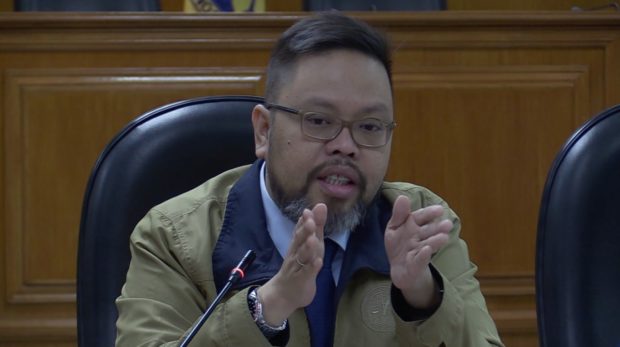
Comelec spokesperson James Jimenez. INQUIRER.net file photo / RYAN LEAGOGO
MANILA, Philippines — Commission on Elections (Comelec) spokesperson James Jimenez said a nationwide cancellation of the 2022 polls is unlikely should there be a surge in COVID-19 cases. But he also said that polls postponement in certain areas is still possible if needed.
“Unlikely…when you say we cancel an election, that means that the conditions for free and fair elections don’t exist. When you have a surge, that’s not the case,” Jimenez said in a press conference on Monday as the country prepares for the looming threat of the Omicron variant of SARS-CoV-2, the coronavirus that causes COVID-19.
“The people have to be very careful, yes. But hindi nawawala yung possibility ng free and fair elections…What may be possible is that if, let’s say, just the possibility, in one location, lahat ng BEI (Board of Election inspector) tinamaan ng COVID, wala kang ma-replace then posible kang mag-cancel ng elections, pero doon lang,” he explained.
“Area cancellations are still possible, isolated cases can be taken into consideration but ‘yung nationwide cancellation, unlikely,” he added.
According to Jimenez, the Comelec can delay the elections only if conditions to ensure “free and fair” polls do not exist.
Still, the election can be delayed only for a “reasonable period of time.”
“It’s interpreted to mean within 30 days from the cessation of the problem. Kunwari nagkabaha, nagkaroon ng postponement ng election, within 30 days after nawala yung baha, pwede ka na dapat magsagawa ng halalan,” he said.
(It’s interpreted to mean within 30 days from the cessation of the problem. For example, there’s flooding and the election is postponed, within 30 days after the flooding has subsided, you can already hold the polls.)
“If there is an outbreak of such magnitude that the Comelec decides it will be necessary to postpone the elections, then yes you can postpone the election and remember you have within 30 days to resolve that problem,” he added.
To prevent or delay the entry of the Omicron variant in the Philippines, the government has banned inbound flights from South Africa, Botswana, Namibia, Zimbabwe, Lesotho, Eswatini, Mozambique, Austria, the Czech Republic, Hungary, the Netherlands, Switzerland, Belgium, and Italy until December 15.
The government, however, has yet to shut Philippine borders on Hong Kong and Australia, the closest areas in the region that already had a confirmed case of the Omicron variant.
The B.1.1.529, a variant of concern and given a Greek name Omicron, was recently discovered in South Africa.
The Comelec, Jimenez said, continues to coordinate with the government’s pandemic task force.
“A lot of people are very concerned, especially because it’s a new variant, so the tendency is to imagine the worst of it,” he said.
“So we’re looking at that, what the disease experts are saying about Omicron and we will adjust accordingly. In any case, from the very beginning naman, alam natin that there is always a possibility na this lull that we’re in right now might change very quickly,” he added.
RELATED STORY
IATF finalizing parameters on alert system amid Omicron threat